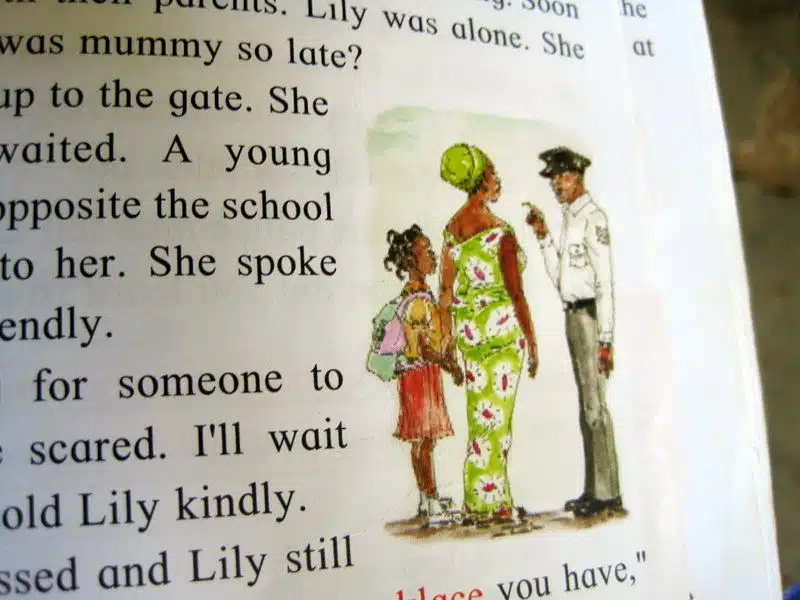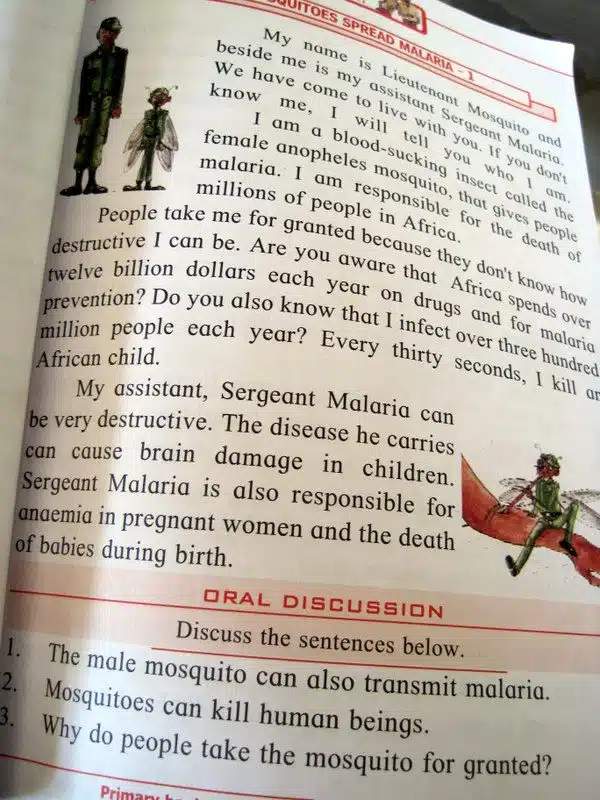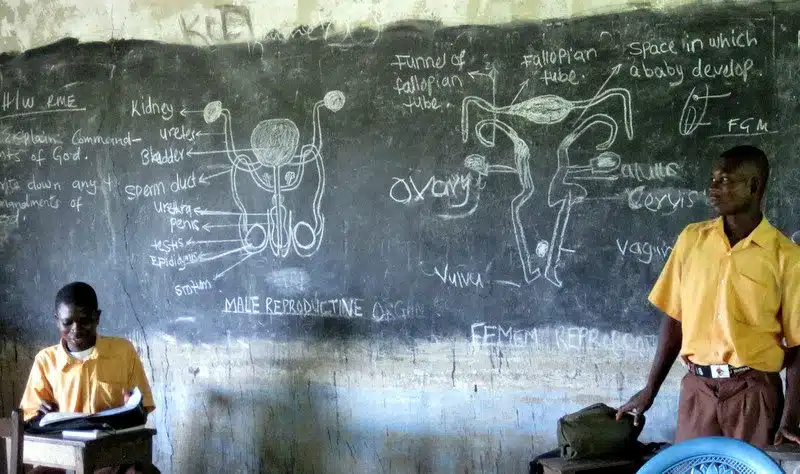After spending time in about fifteen different schools here in my first two months in Ghana in 2009, I now present you with…
Fun Facts about Ghana’s Educational System! Please note that this article was written in 2009 and much may have changed since then, and certainly is different in other parts of the country, even at the time.

1.) Because of the extremely limited supply of computers for schools (and the extreeeeemely limited supply of internet access), computers are frequently moved from place to place to ensure fair distribution and safe storage.
And how do things get moved in Ghana? On a head-top, of course!
Check out the photo above!

2.) There is a unified national curriculum for the entire country, with textbooks by grade that are the same for every school!
3.) In Boston Public Schools, we talked a lot about “Culturally Relevant Pedagogy“– teaching that takes into account the culture and experiences of students, and draws upon their daily life experiences to make new learning meaningful and approachable.
Listen: the National Curriculum of Ghana has culturally relevant pedagogy down pat!

Example One: Even when the readings in the national Ghana textbooks are of European origin (ex: “Jack be nimble, Jack be quick…”) the illustrations are all of folks with rich Ghanaian skin tones and typical Ghanaian garb: a mix of gorgeous”traditional” African print dresses and shirts and trousers.
See the example photo to the left and examine the green dress. I passed about ten women with the exact same outfit on the way to visit the school with that particular textbook that day! Very accurate illustrations. Culturally relevant!
Example Two: The Stage (Grade) Four textbook has this rather bizarre but also very relevant ongoing dramatization of the life of a malaria-carrying mosquito.
Since nearly every single person I have met here in Ghana either has malaria currently or is just recovering from a recent recurrence, this is a highly relevant text for youth to read!
If you squint at the photo below of the first installment of the dramatization, you will see that the tale begins a little something like this:

“My name is Lieutenant Mosquito, and beside me is my assistant Sargent Malaria. If you don’t know me, I will tell you who I am. I am a blood-sucking insect called the female anopheles mosquito that gives people malaria. I am responsible for the death of millions of people in Africa.”
See what I mean? A hearty stew of bizarre, relevant, educational, and freaky. And this doesn’t even include installment three where the mosquito starts cackling maniacally: “HAHAHA I WILL INFECT YOU! HAHAHA!!”

4.) In Grade Eight at every school in Ghana, the national curriculum guides the teachers to teach Reproductive Health!
This meant that, even in the classroom of the extremely rural Ghanaian school I visited recently (where there wasn’t even electricity), there was a giant diagram of a uterus emblazoned upon the blackboard!
I find this national reproductive ed initiative so admirable in the proactive way it addresses the central yet touchy issue.

And on a side note, it gave me a good chuckle to peek into a current student’s Reproductive Health notebook (pictured, above) and see her mis-copied title:
“REPRODUCTION IN HUMUS.”
Ooo– who knew the Middle Eastern condiment had such a spicy private life?
5.) There are “Culture” classes in nearly every school that involve students practicing African drumming and dancing! Awesome!
Moreover, drum beats call students to school each early morning in Sogakope! I’ve stopped using my alarm because they wake me on time, too! And I like it.

6.) The walls of the classrooms often have instructive signs that one would never see in the U.S.
A recent favorite is pictured above: Detailed instructions on how to correctly use the latrine school bathroom correctly– including a very posh description of how to dispose of “anal cleansing material!”
And there you have your Ghana Educational updates for the day.
May visions of reproducing hummus, marching Malaria soldiers, and anal cleansing material dance through your pretty head until morning!

The author, Lillie Marshall, is a 6-foot-tall National Board Certified Teacher of English, fitness fan, and mother of two who has been a public school educator since 2003. She launched Around the World “L” Travel and Life Blog in 2009, and over 4.2 million readers have now visited this site. Lillie also runs TeachingTraveling.com and DrawingsOf.com. Subscribe to her monthly newsletter, and follow @WorldLillie on social media!

Casey B
Tuesday 17th of November 2015
Cool Facts! Ghana and the USA have some similarities and differences in school curiculums.
Jessica Z
Tuesday 17th of November 2015
School in Ghana seems really interesting and fun. I like how each grade use the same textbook, so people in the same grade can discuss about the topic when they want to share something or are confuse about something. I'm used to using computers when I need it, so the fact that students in Ghana have to share computers and even carry it on their head makes me feel fortunate that I live in a place where there are internet access and a lot of computers.
Emily L.
Wednesday 25th of February 2015
I really enjoyed reading this article. It was very interesting to read about Ghana's school system. My favorite fact is the one about how the textbooks in each grade are the same in every school. This is kind of like schools in Boston because a lot of the schools use the same textbooks.
Jessie James
Friday 26th of September 2014
You forgot to mention that from year 7 on 99% of Ghanaians go to boarding schools where discipline is paramount so much so that the average Ghanaian is so polite,disciplined, respectful to adults even if they are just a year older than they are.They are so respectful to adults down there,rich or poor. It's unbelievable.
Lillie
Friday 26th of September 2014
I totally agree. The kindness and politeness of students in Ghana made me decide to stay in teaching rather than quit!
Sally
Wednesday 3rd of April 2013
Interesting! When I visited Ghana, students also told me some texts were written in the local dialect so they had lessons in their local language. Awesome
Lillie
Wednesday 3rd of April 2013
Ah, so true! I was deeply impressed with how many dialects my colleagues spoke in Ghana.